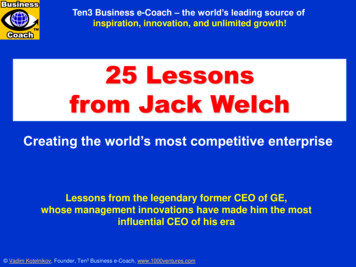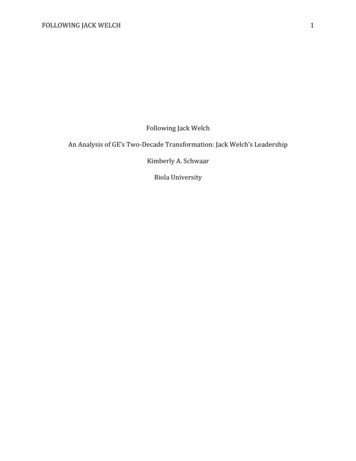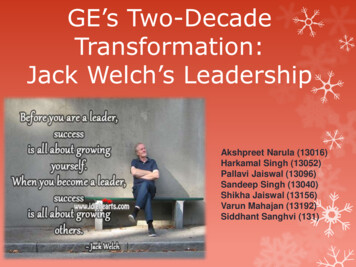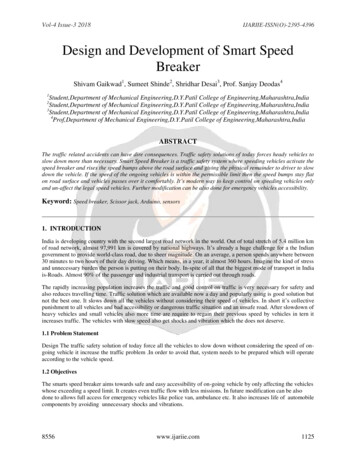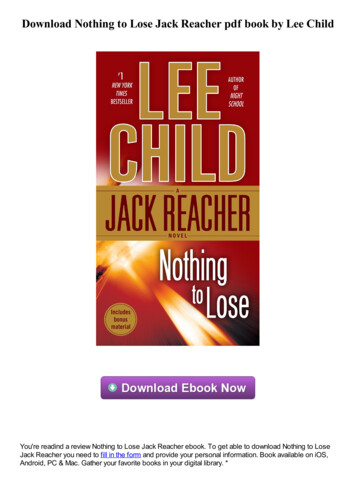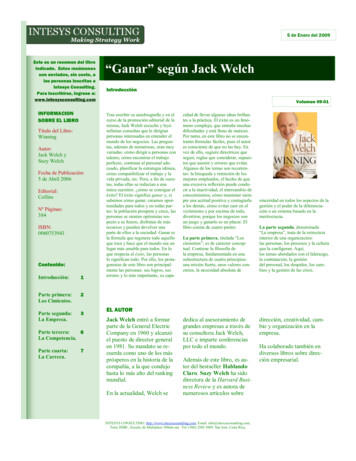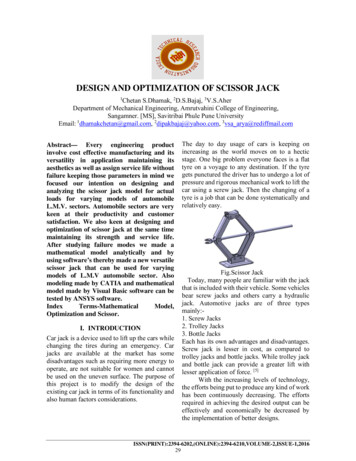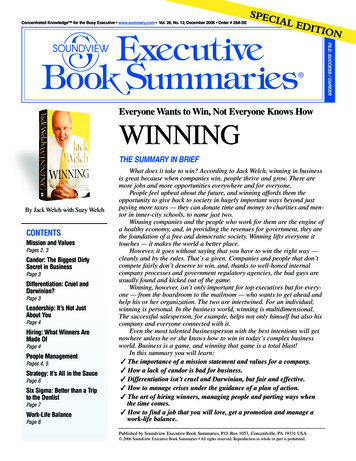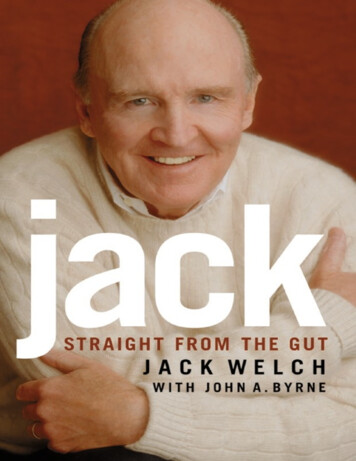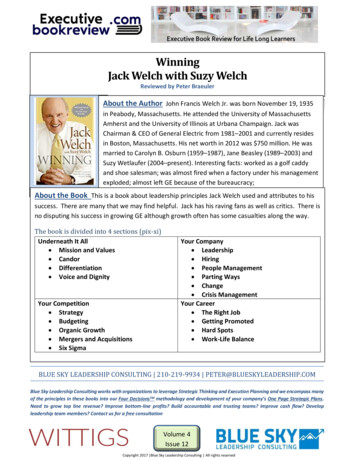
Transcription
WinningJack Welch with Suzy WelchReviewed by Peter BraeulerAbout the Author John Francis Welch Jr. was born November 19, 1935in Peabody, Massachusetts. He attended the University of MassachusettsAmherst and the University of Illinois at Urbana Champaign. Jack wasChairman & CEO of General Electric from 1981–2001 and currently residesin Boston, Massachusetts. His net worth in 2012 was 750 million. He wasmarried to Carolyn B. Osburn (1959–1987), Jane Beasley (1989–2003) andSuzy Wetlaufer (2004–present). Interesting facts: worked as a golf caddyand shoe salesman; was almost fired when a factory under his managementexploded; almost left GE because of the bureaucracy;About the Book This is a book about leadership principles Jack Welch used and attributes to hissuccess. There are many that we may find helpful. Jack has his raving fans as well as critics. There isno disputing his success in growing GE although growth often has some casualties along the way.The book is divided into 4 sections (pix-xi)Underneath It All Mission and Values Candor Differentiation Voice and DignityYour Competition Strategy Budgeting Organic Growth Mergers and Acquisitions Six SigmaYour Company Leadership Hiring People Management Parting Ways Change Crisis ManagementYour Career The Right Job Getting Promoted Hard Spots Work-Life BalanceBLUE SKY LEADERSHIP CONSULTING 210-219-9934 PETER@BLUESKYLEADERSHIP.COMBlue Sky Leadership Consulting works with organizations to leverage Strategic Thinking and Execution Planning and we encompass manyof the principles in these books into our Four DecisionsTM methodology and development of your company’s One Page Strategic Plans.Need to grow top line revenue? Improve bottom-line profits? Build accountable and trusting teams? Improve cash flow? Developleadership team members? Contact us for a free consultationVolume 4Issue 12Copyright 2017 Blue Sky Leadership Consulting All rights reserved
The genesis for the book. Jack says “I have been asked literally thousands of questions.But most of them come down to this: What does it take to win?” (p3) and “I thinkwinning is great. Not good – GREAT. Because when companies win, people thrive andgrow. There are more jobs and more opportunities.” (p4)Underneath it allMission and Values There are certain values that are table stakesValues really are about the behaviors you expect from your people – the HOW of the missionBe specific and be sure your values are alive in the company – reward, punish, hire, fire Mission answers the question: How do we intend to win in this business? Balance the possible and theimpossible and give people a clear sense of direction1GE: THE MOST COMPETITIVE ENTERPRISE IN THE WORLD BY BEING NO. 1 OR NO. 2 INEVERY MARKETCandorJack says the lack of candor is the biggest dirty little secret in business. With candor everything just operatesfaster and better. (p25) Candor leads to winning in 3 main ways (p27)1. Candor gets more people involved and therefore you increase idea generation2. Candor gets things done faster because everything is out in the open and can be acted upon3. Candor cuts costs because you don’t have to hunt for it, debate it, or confirm things.Why then is candor so hard? “People don’t speak their minds because it’s simply easier not to. When you tell itlike it is, you can so easily create a mess – anger, pain, confusion, sadness, resentment.” (p29)Differentiation“Companies win when their managers make a clear and meaningful distinction between top – and bottom –performing businesses and people, when they cultivate the strong and cull the weak. (p37)People – 20 70 10Assess your people in terms of performance – top 20 percent, middle 70, and bottom 10 – and then ACT on thatdistinction. Treat the stars as the best; manage the “enormously valuable” 70% and keep them engaged andmotivated and move up those with potential as you help them to grow; and LET GO of the bottom 10% and allowthem to good and happy at what they do best – somewhere else. Let people know where they stand – merit-1Welch, Jack WINNING Page 14-15Book Review: WinningPage 2 7Volume 4Issue 12
based. Jack says “protecting under-performers always backfires. The worst thing, though, is how protectingpeople who don’t perform hurts the people themselves.” (p45)Voice and Dignity“People want the opportunity to speak their minds and have their ideas, opinions, and feelings heard and peopleinherently and instinctively want to be respected for their work and effort and individuality.” (p.53)Work-Out Process – 2 to 3-day events at GE sites patterned around New England town meetings. 30 to 100employees with outside facilitator. Commitment – 75% of ideas resolved immediately (yes/no); 25% within 30days.Your CompanyLeadershipThis section discusses 8 things leaders do according to Welch. They are all familiar to us and involve building ourteam members, creating a clear picture of the vision and their part to play, being there, establishing trust andcandor, making the tough calls, answer questions, act on promises, inspire risk-taking and celebrate often.Hiring1. Three acid tests of integrity, intelligence, and maturity2. Have high personal energy, be able to inspire and energize others andhave the courage to step up and make the hard calls. They also mustbe able to get the job done and do it all with passion.3. Your top leadership team members must be authentic, comfortable intheir own skin, be able to “see around corners” and have a willingnessto surround themselves with people better and smarter than they are.People ManagementOnce you hire the right people you need to care for them, nurture them and retain them. To do this Welchidentifies 6 practices to do this well. (p98)1.2.3.4.5.6.Make sure HR is at the table (C-suite)Use a rigorous evaluation systemCreate effective mechanisms to motivate and retain employeesFace straight into charged relationshipsFight gravity and really take on the middle 70 percentCreate a flat org chart with clear reporting relationships and responsibilitiesParting WaysThere are two guiding principles according to Welch: NO SURPRISES and MINIMAL HUMILIATION. (p120)The more transparent you are the more everyone knows how the company is doing.Book Review: WinningPage 3 7Volume 4Issue 12
“three main ways that managers get firing wrong – moving too fast, not using enough candor, and taking toolong.” (p124)“Every person who leaves goes on to represent your company. They can bad-mouth or praise.” (p126)ChangeWelch encourages four key practices to carrying out change (p.134):1.2.3.4.Every change initiative should have a clear purpose or goal.Hire/promote only true believers and get-on-with-it types.Ferret out and get rid of resisters, even If their performance is satisfactory.Look at car wrecks.Crisis ManagementJack’s guidance when that “oh-God-no situation happens: Assume the problem is worse than it appearsAssume there are no secrets – everyone will find outAssume your handling of the crisis will be portrayed in the worst possiblelightAssume there will be changes in processes and peopleAssume your organization will survive and be strongerAvoid crises is by creating tight controls, good internal processes and having a culture of integrity. (p151)Your CompetitionStrategy“In real life, strategy is actually very straightforward. You pick a general direction and implement like hell. (p165)1. Come up with a big aha for your business – a way to gain sustainable competitive advantage2. Put the right people in the right jobs to drive the big aha forward3. Relentlessly seek out the best practices to achieve your big ahaAs Jack put it: “Our strategy lasted because it was based on two powerful underlying principles: commoditizationis evil, and people are everything. (p171)GE: MOVE AWAY FROM BUSINESSES THAT WERE BEIGN COMMODITIZED TOWARD BUSINESS THATMANUFACTURED HIGH-VALUE TECHNOLOGY PRODUCTS OR SOLD SERVICES INSTEAD OF THINGS. MASSIVELYUPGRADE OUR HUMAN RESOURCES WITH A RELENTLESS FOCUS ON TRAINING AND DEVELOPMENT. (P170)He then shares his four-slide exercise to find your big ahaBook Review: WinningPage 4 7Volume 4Issue 12
BudgetingIf your company is built on trust and you have mastered the chapter on candor then you are ready to simplify yourbudgeting process. Eliminate the negotiations where everyone is covering their a** or the process wheremanagement already knows the numbers and still asks for input that will be ignored. Instead ask two questions:1. How can we beat last year’s performance?2. What is our competition doing, and how can we beat them?Now create an operating plan which can change as conditions change. Your goal? Question 1 and 2! (p198)Organic GrowthJack’s three guidelines for making organic growth a winning proposition (p207):1. Spend plenty up front, and put the best, hungriest, and most passionate people in leadership roles.2. Make an exaggerated commotion about the potential and importance of the new venture.3. Err on the side of freedom; get off the new venture’s back.Mergers and AcquisitionsAvoid the seven pitfalls (p.220):1.2.3.4.5.6.7.Believing that a merger of equals can actually occur.Focusing so intently on strategic fit that you fail to assess cultural fit.Entering into a “reverse hostage situation”.Integrating too timidly.Conqueror syndrome.Paying too much.Resistance. New owners will always select people with buy-in over resisters with brains.Six Sigma“six Sigma is a quality program that, when all is said and done, improves your customers’ experience, lowers yourcosts, and builds better leaders. Six Sigma accomplishes that by reducing waste and inefficiency and by designinga company’s products and internal processes to that customers get what they want, when they want it, and whenyou promised it.” (p247)Your CareerThe Right JobWhen looking for a job pay attention to the signals sent out regarding your fit for the job. Check out page 257 fora summary of the good and bad for each category: People, opportunity, options, ownership, and work content.And remember that “it is virtually impossible to know where any given job will take you.” (p256)Book Review: WinningPage 5 7Volume 4Issue 12
Getting Promoted“All careers, no matter how scripted they appear, are shaped by some element of pure chance.” (p278)BUT “In the long run, luck plays a smaller role in your career than the factors that are within your control.” (279)Do deliver sensational performance, far beyond expectations, and at every opportunity expand your job beyondit official boundaries.Don’t make your boss use political capital in order to champion you.Hard SpotsYou light up thinking about that truly great boss you had; and you cringe about the bad boss that can just aboutkill you (p299). Rule number one is DON’T let yourself become a victim.“Generally speaking, bosses are not awful to people who they like, respect, and need. Think hard about yourperformance.” (p302)Work-Life Balance – best practices (p333)1. Keep your head in whatever game you’re at. – compartmentalize2. Have the mettle to say no to requests and demands outside your chosen work-life balance plan.3. Make sure your work-life balance plan doesn’t leave you out.Bonus MaterialLeadership Blunders2Adam Grant interviewed Jack and Suzy Welch on their book – The Real-Life MBA. In summary, here are the 6leadership blunders they discussed:1.2.3.4.5.6.2They don’t invest in developing their people.They reward people who have great results but bad behavior.They don’t provide meaning.They don’t let people know where they stand.They only hire from elite schools.They don’t give people the confidence to try new things.Grant, Adam – Even Smart Leaders Make These Mistakes Published on June 16, art-leaders-make-adam-grant/Book Review: WinningPage 6 7Volume 4Issue 12
Our Wicallwww.ExecutiveBookReview.comWhat thought, or idea had the biggest impact on you today?What is one specific action you will take TODAY from what was discussed?HOW will you implement this action?Volume 4Issue 12Copyright 2017 Blue Sky Leadership Consulting All rights reserved
Dec 01, 2017 · Winning Jack Welch with Suzy Welch Reviewed by Peter Braeuler About the Author John Francis Welch Jr. was born November 19, 1935 in Peabody, Massachusetts. He attended the University of Massachusetts Amherst and the University of Illinois at Urbana Champaign. Jack was Chairman &am
